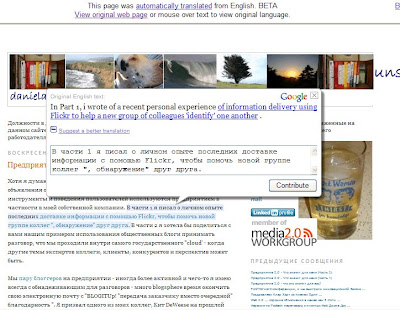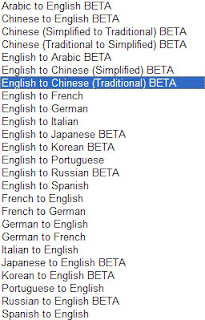It seems very easy to use per the screen below of my blog translated into Russian- but i could not find any information about what happens once a user submits a suggestion for a better translation. I would suspect that they have to have some sort of quality process before they take one translation over another- and just like in Google Image Labeler when the tags are attached to images only when two 'players' use the same tag (a match)- i would suspect that multiple people would need to match that translation identically before it gets fed into the computers for making the translation software better at translating web pages.
 Automated translation and assigning 'aboutness' to content via categorization in multiple languages was a topic that came up during last week's Robert Scoble's ScobleShow interview with Clare Hart because of our handling of content in 22 languages (video to be made available hopefully soon on Podtech). The conversation was around the monitoring and measuring of new media (e.g. blogs, podcasts, vlogs) for Corporate PR, Marketing and Product Development professionals and how with the day over day growth of non-english content, teams that do not have multiple languages on staff still need to be able to monitor what consumers are saying in their local language.
Automated translation and assigning 'aboutness' to content via categorization in multiple languages was a topic that came up during last week's Robert Scoble's ScobleShow interview with Clare Hart because of our handling of content in 22 languages (video to be made available hopefully soon on Podtech). The conversation was around the monitoring and measuring of new media (e.g. blogs, podcasts, vlogs) for Corporate PR, Marketing and Product Development professionals and how with the day over day growth of non-english content, teams that do not have multiple languages on staff still need to be able to monitor what consumers are saying in their local language.
 It is interesting to see the languages that are in BETA for this service because it seems to be indicative of the languages of growth on the web and in the social networking world- which i am sure Google hopes will make their translation services for those languages better through participation by those actual communities. They are also obviously the 'hardest' of the languages to do computer translation due to their non-Latin base.
It is interesting to see the languages that are in BETA for this service because it seems to be indicative of the languages of growth on the web and in the social networking world- which i am sure Google hopes will make their translation services for those languages better through participation by those actual communities. They are also obviously the 'hardest' of the languages to do computer translation due to their non-Latin base.

1 comment :
Nice blog layout
Post a Comment